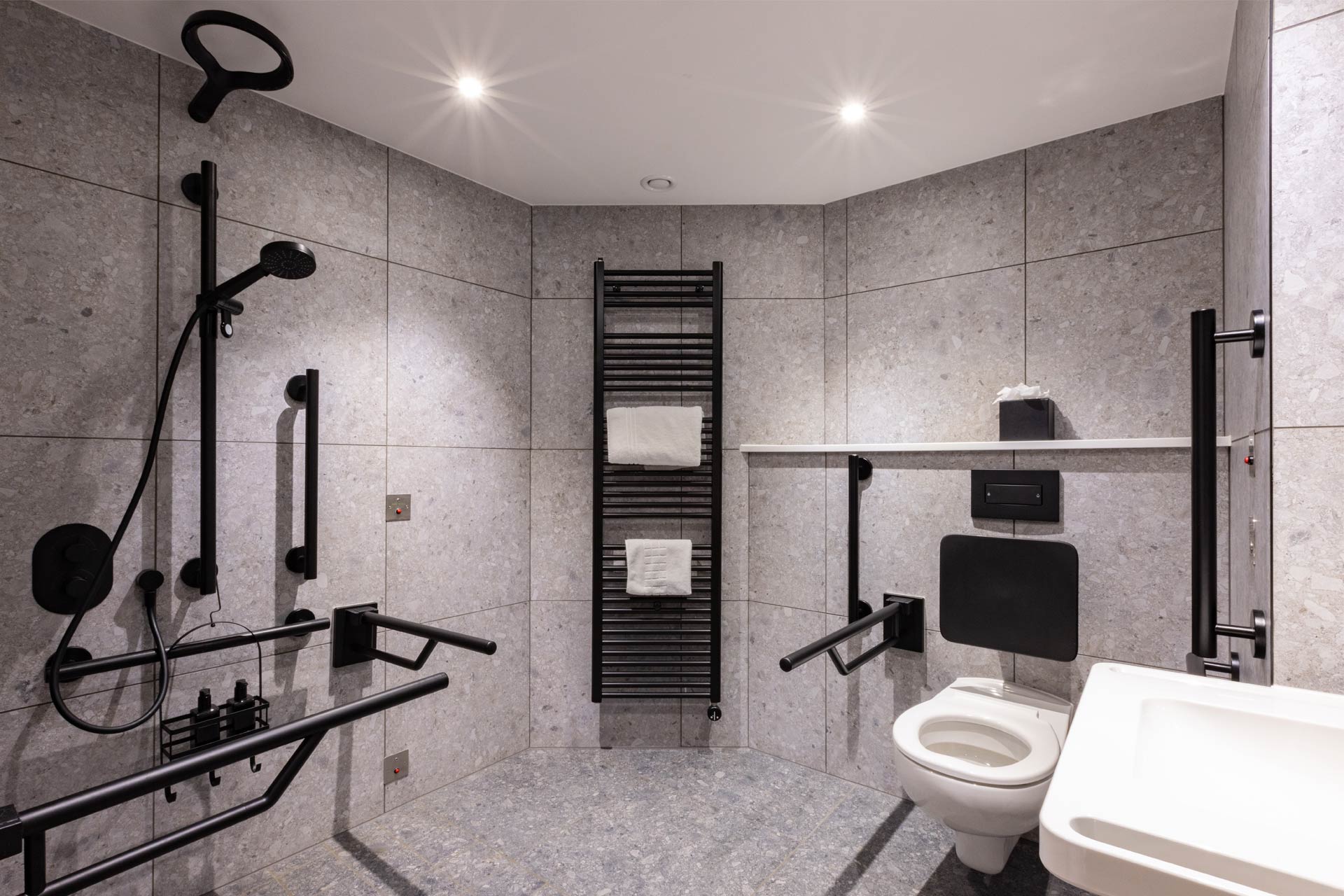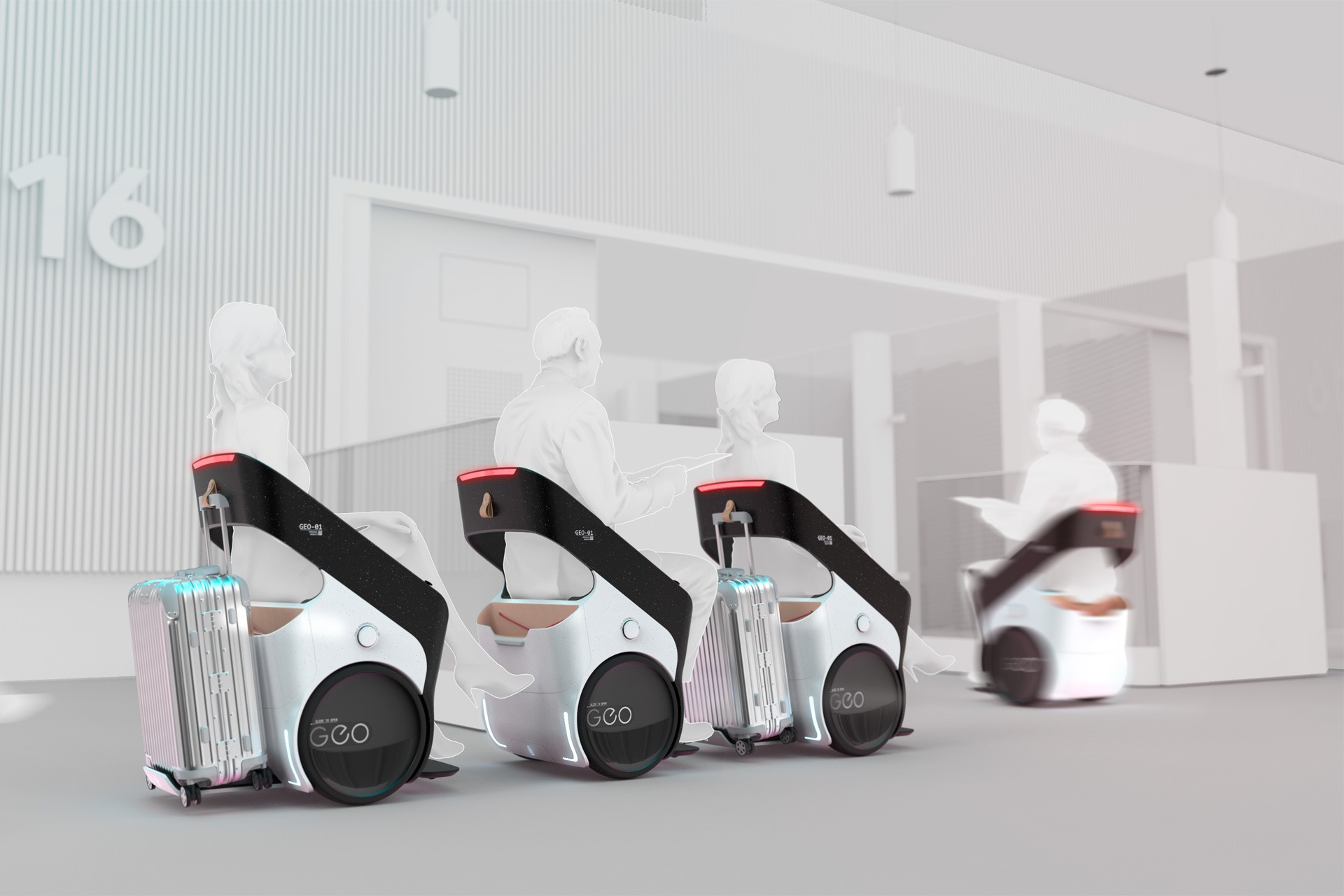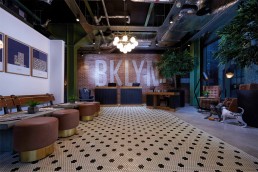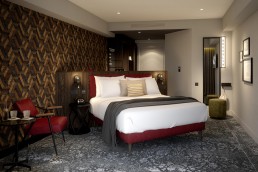As the global travel market continues to evolve, hospitality experts reveal why inclusivity and accessible design is much more than simply a box-ticking exercise.
The stress and uncertainty of travel can be overwhelming at times, but for those with a disability, it is often amplified by a lack of suitable services and facilities, not to mention a shortage of quality accommodation that meets a range of specialist needs. As Robin Sheppard, Chairman of Bespoke Hotels puts it, “most days, I and the UK’s 14 million-strong disabled community, will be given reason to think ‘they could do better than that’.”
Since being diagnosed with Guillain-Barré Syndrome in 2004, a paralysing illness that affects the peripheral nervous system, Sheppard has been a driving force in creating a more accessible hotel industry. “I’m an eternal optimist, and at the launch of this year’s Blue Badge Access Awards, I revealed that our theme for 2023 was ‘progress’, because almost every day, I witness something indicative of the changing attitudes towards disability.”
Having spearheaded the awards since its inception in 2016, Sheppard and co-founder Fiona Jarvis are now working closely with AHEAD, Sleeper’s awards programme for hospitality experience and design, to introduce a new category. Launching this year, it will recognise hotel projects demonstrating thorough consideration of accessibility and other issues facing disabled guests and staff. Jarvis explains: “Great strides are being made, but there is still some way to go – the fact that a Michelin-starred restaurant can still get away with not installing a disabled toilet is outrageous in the 21st century!”
As always, the judging process will be rigorous and robust, the difference to other categories being that a specialist panel will examine each entry to ensure winners are delivering genuinely accessible experiences. Those triumphant will be revealed at AHEAD’s ceremonies in Singapore, Dubai, New York and London later this year, with the ultimate aim being to build awareness amongst developers, hoteliers, architects and interior designers – those responsible for the creation of new hotels worldwide and decision-makers who can drive real change.
According to research by VisitEngland, accessible tourism in England alone is worth £15.3 billion a year, so the business case is strong for those with the forethought to build accessibility into their projects from the outset. But first, operators must understand that a ramp at the front door and a bedroom or two on the ground floor doesn’t constitute accessible. “There is a goldmine out there waiting for investment,” explains Sheppard, adding that hospitality businesses are losing revenue each month by ignoring the needs of disabled people, as well as those accompanying them. “Disabled consumers are influenced in their choice of airline, hotel and restaurant by specific needs.” At Hotel Brooklyn in Manchester for instance, Bespoke Hotels quantified the incremental revenue of its 18 accessible suites as £217,000 in its first full trading year, with many guests then choosing to stay at the group’s second outpost, Hotel Brooklyn in Leicester, based on their positive experience.
“I’m an eternal optimist, because almost every day, I witness something indicative of the changing attitudes towards disability.” – Robin Sheppard
STYLE AND SUBSTANCE
Such examples reinforce the fact that those requiring accessible facilities are loyal to hospitality venues who get it right. So, what can owners and operators do to create more user-friendly destinations? With the ambition to make Hotel Brooklyn as inclusive as possible, Sheppard collaborated with accessible design specialist Motionspot to introduce the Liberty concept, which is shaped by specific features throughout a hotel’s guestrooms and communal areas. In practice, this includes the clever incorporation of accessible equipment; ceiling track hoists concealed in light fittings and matte black grab-rails in the bathrooms – which are removable when not required – as well as easy-to-use flush plates, electric curtains controlled from bedside panels, and interconnecting rooms for carer and family access.
And style is crucial; Sheppard firmly believes accessible rooms should look and function exactly as their standard counterparts. “There remains a preconception in the hotel industry – and maybe even an acceptance from the disabled community – that accessible guestrooms are somehow a downgrade from a standard room,” he explains. “But by their nature, accessible rooms should be more spacious as they provide clearance for wheelchair users. So why not create spaces regarded as an upgrade? Approach it positively; it’s an opportunity, not a burden.”
Sheppard’s optimism is shared by Ed Warner, founder and CEO of Motionspot, who continues to challenge the hotel sector to develop more accessible design schemes. “There is some fantastic work going on across the industry, with a handful of hotel groups and individual operators embracing accessibility at an early stage of the design process. However, hospitality has a long way to go, as there remains a mindset that designing to minimum standards is sufficient.” Adding to this sentiment, Warner argues that accessible design was traditionally a box-ticking exercise, but in today’s market, operators must understand that the minimum is no longer enough. And that goes for the restaurants, bars, events spaces and leisure facilities, not just the guestrooms.
Demonstrating that accessible hospitality can blend form and function, Motionspot is confident its designs for Hotel Brooklyn will inspire other architects and interior designers to push the boundaries beyond predominantly functional schemes. “An architect studies for seven years, yet the amount of time they spend understanding accessibility during their qualification is a matter of hours, so it’s an education piece,” says Warner. “I understand why the industry has historically taken a cautious approach, because they are worried about getting it wrong. They don’t know what is possible or the new innovations available on the market. If Motionspot set out to do one thing, it’s to provide advice and help designers to challenge their thinking.”

RESTORE AND REFORM
A project that has enabled the studio to showcase the possibilities is The Newt, a Somerset estate that opened in 2019 after its conversion into a luxury hotel, restaurant and spa. Working closely with Richard Parr Architects from an early stage, Motionspot carried out an access review of the entire site – including its botanic gardens – before collaborating on the design of accessible suites, specifying products that complement the Grade II-listed mansion’s aesthetic while being suitable for those with physical, sensory or cognitive impairments. “Refreshingly, the client understood they wanted to make the entire estate, not just the building, as accessible as possible within the constraints of the existing fabric,” Warner explains. This philosophy also fed into the pre-arrival experience, with Motionspot producing a guide for staff training that is also used to support disabled guests before and during a visit to the property.
Demystifying the stigma that historic buildings present complex challenges for accessible facilities, The Newt proves that balancing period aesthetics with access-for-all facilities is achievable, serving as a blueprint for future properties. “The key with a heritage site is to think creatively – there are always solutions,” states Warner. “Ultimately, if a property isn’t inclusive today, then it won’t be relevant for the next 300 years. We must preserve the heritage of our built environment whilst equally improving its accessibility.”
“An architect studies for seven years, yet the amount of time they spend understanding accessibility is a matter of hours, so it’s an education piece.” – Ed Warner
INTERNATIONAL IDEOLOGY
As the UK’s hospitality sector continues to become more inclusive, international hotel groups are looking to implement similar principles into their new developments, with Warner emphasising that those raising awareness around the issue are helping the cause. Red Sea Global in Saudi Arabia has promised that giga project Amaala will be entirely disability-friendly, introducing ramps and accessible rooms at all of its hotels as well as offering adapted diving experiences. Amilla Maldives meanwhile is set to become the world’s first resort verified by UK-based accessible and inclusive hospitality experts, IncluCare. Demonstrating what Amilla describes as ‘total guest inclusion’, the certification follows an assessment and training programme across the resort, and will be presented by British TV personality and disability advocate Sophie Morgan, who herself is paraplegic. “Knowing that disabled people are, for the first time, going to be able to experience the Maldives, and that our needs will be taken care of throughout our stay, is beyond transformative,” explains Morgan, who will also be working towards obtaining a PADI Open Water certificate during her visit. “Amilla is leading the way in inclusive travel and expanding our world as a result.”
As newbuild integrated resorts and vast mixed-use lifestyle destinations continue to pop up across the globe, accessible design has the potential to be woven into a development’s fabric from the outset, without additional cost to the owner. Warner speaks from experience: “Having to make retrofits later down the line is where things become expensive, so getting it right the first time is crucial.”

TRANSFORMING TRAVEL
The same notion applies to the wider travel sector, though increasing awareness around inclusivity and new legislation is leading to positive progress, according to Dan MacInnes, Director at London-based industrial design consultancy PriestmanGoode: “More so than ever, travel companies are recognising the need to make their locations and services fully accessible, as the experience should be equal for all passengers.” MacInnes explains that to achieve this consistency, operators must engage with their customers to ensure that requirements are met. In doing so, they can produce what he calls “a single design for all” rather than multiple variations, making it more efficient to build and cheaper to maintain.
Helping operators to offer more accessible services, PriestmanGoode has designed several travel solutions, from airline seats to self-balancing personal electric vehicles. Air 4 All, developed by a consortium including Flying Disabled, SWS Certification, Sunrise Medical and Delta Flight Products, allows wheelchair users to travel in their own wheelchair for the entire duration of a flight. Geo meanwhile is a kerbside-to-gate mobility service created in partnership with Centaur Robotics and Naurt. The vehicle was recently presented to Emirates as part of Aviation X Lab, an aviation-specific incubator programme also involving Thales, Collins Aerospace, GE Aviation and Airbus.
With digital technology and VR experiences evolving too, MacInnes hopes the challenges faced by those with a disability will soon become a thing of the past. “The design sector is always looking to improve, which is why we believe it can deliver a better outcome than legislation on its own. Legislation sets the standard, but design pushes it forward – there’s a constant focus on innovation.”
Sheppard holds a similarly positive outlook: “While I can only give the hospitality and travel markets a ‘could do better’ for inclusivity today, I am optimistic and confident they will do better in the years to come.”
CREDITS
Words: Ben Thomas
Magazine: Sleeper 109
Related Posts
22 September 2020
Feature: Hotel Brooklyn, Manchester
24 March 2020



